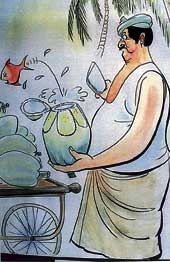 |
Leading criminal lawyer Biswajit Mukherjee concedes that one in three cases received by him at his chamber is related to dowry. Former chief secretary and chairperson of the Women’s Commission, Lakshmi Singh, confirms that 95 per cent of the 200-and-odd cases received by the commission were from dowry victims.
Lawyers in the lower court confirm the rising trend of divorce proceedings resulting from cruelty to wives, while CID officers confirm the growing number of dowry deaths in the state. Alarmed at the rising number of such cases, a subdivisional judicial magistrate was designated last year for hearing only dowry-related cases.
There are of course exceptions, exceptions that prove the rule. Mukesh Sah claims that when his brother got married, no dowry was sought.
Vikram Singh recalls that when her elder sister got married, his father was taken aback when no demand was made. But when it came to the younger sister, every proposal is accompanied by demands for dowry.
But speak to any educated person, old or young, and he or she would vehemently condemn the practice. “In our community, there is no such thing as dowry,” says a smug Hitesh Bhagat of Doon Tent House on Hazaribagh Road in Ranchi.
C.C. Virmani, former president of Punjabi Hindu Biradari at Ranchi, is also emphatic about disowning dowry. Asif Khan, studying law at Pune, points out that among Muslims, brides do not pay dowry, rather the grooms are expected to pay the Meher, while Shweta Tirkey, preparing for her civil services exam, and Ratan Tirkey, a political activist, boast that dowry is non-existent among the tribals. “Ours is the only community,” boasts Tirkey, “where births of girls are celebrated.” Mrityunjay Roy, a project officer at XISS, who is about to get married to a colleague at the same institute, also denies dowry dominating community marriages.
These denials sound strange when one looks back to the tragic suicide committed by a 20-year-old girl in Ranchi this month. Daughter of a security guard, Ruby ended her life because she did not want her father to spend Rs 1.5 lakh as dowry. It would be better spent, she decided, to educate her brother. Ruby is already history. Readers are unlikely to remember her. Her family would have got on with their lives.
But, strangely, nobody even demanded action against families, which demanded dowry from her father, thus instigating her to end her life.
Had she belonged to a wealthier family or had she been a model, the media would have pursued “justice” with greater vigour, one suspects.
If only she had boasted of having influential friends like Priyanka Gandhi, as Jessica Lal fortunately did, the course of the crusade would have been different. But then the poor girl happened to be just the daughter of a security guard. So, the women’s groups nor the college or the university she went to, could bother less. Nor did her death outrage the guys whose national pride gets so hurt when the Indian cricket team loses to Sri Lanka, enough to prompt them to hit the streets.
There is no ambiguity in the law though. What is popularly known as the Anti-Dowry Act lays down that demanding dowry is as much of a crime as giving dowry.
But the police never acts against dowry-givers. The courts never insist that the brides’ families, too, should be punished. Instead, brides are deemed to be victims and grooms the villains. No research has been done but there is evidence to suggest that most of the villains eventually receive the benefit of doubt. They get away and are let off because of the loop-holes in the law.
There are indications to suggest that there are double standards. People who speak against dowry in public are not averse to accepting it in private. Those who cry hoarse against dowry while seeking matches for their daughter, smugly demand dowry in the case of their sons.
The law is unlikely to make any difference. Having failed to curb dowry demands in the past 45 years, it is unlikely to perform a miracle now. Only a concerted social movement, specially by the young, can change the situation.
But judging by the reaction from young students, their attitude is ambivalent. Yes, dowry is a social evil; but then it has been a tradition and well, what’s the harm if people give voluntarily — after all brides should get a share in the property of their parents?

